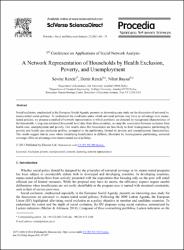A Network representation of households by health exclusion, poverty, and unemployment
Künye
Rende, S., Rende, D. & Baysal, N. (2011). A network representation of households by health exclusion, poverty, and unemployment. Procedia - Social and Behavioral Sciences, 22, 69-79. doi:10.1016/j.sbspro.2011.07.057Özet
Social exclusion, emphasized in the European Social Agenda, presents an interesting case study on the discussion of universal vs. means-tested social policies. To understand the conditions under which universal policies may have an advantage over means-tested policies, we propose a method of network representation in which partitions are detected by background characteristics of the households. Using non-relational household level data from three countries, we map the association between exclusion from health care, unemployment and poverty. Our results show that households are less likely to form homogeneous partitioning by poverty and health care exclusion profiles, compared to the partitioning formed by poverty and unemployment characteristics. The results suggest that in cases where identifying beneficiaries is difficult, illustrated by heterogeneous partitioning, universal coverage offers an advantage over means-tested social policies.


















